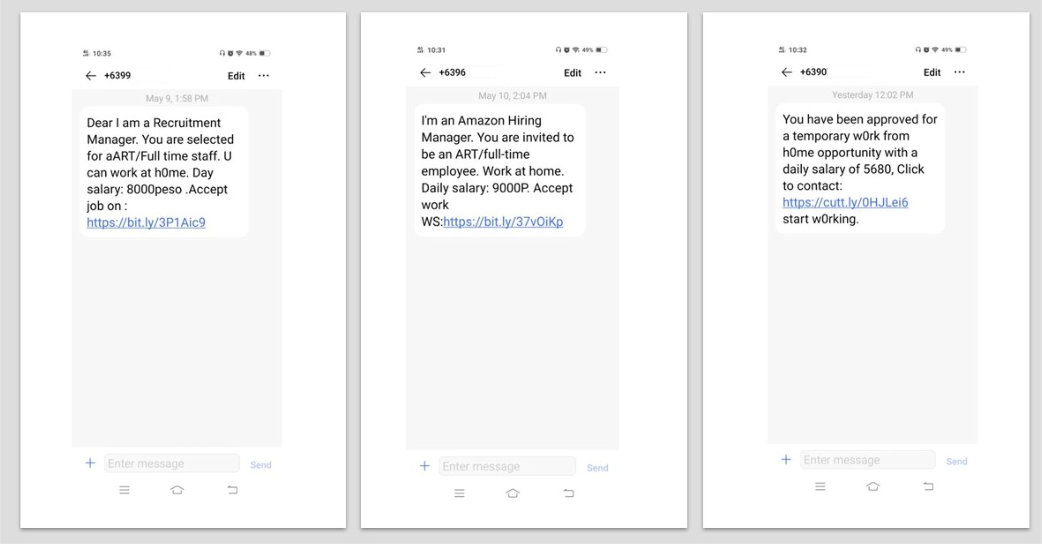NEWS
Cybercriminals continue to prey on Filipino job-seekers. Here’s why

May 30, 2022 2:42 p.m.
If money is what motivates cybercriminals to trick, swindle and steal, then why are they targeting job-seekers who are supposedly income-less and are themselves in need of money?
Job scams have been around for a long time. But it’s getting extra attention lately as Filipinos report receiving way more job invitations through text messages than ever before. These unsolicited job offers promise unbelievably generous earnings in exchange for seemingly easy work that is too tempting to not even try.
Smishing examples
Official statistics reveal that as of March 2022, there are 3.13 million unemployed Filipinos and 7.42 million underemployed or those who have jobs but are still looking for other sources of income.
According to a job report, about 49% of Filipinos are now keen to work remotely due to pandemic concerns such as health and safety. For scammers, this is a goldmine they just wouldn’t miss taking advantage of.
Personal information such as name, birthday, phone number, email address are already valuable — it can actually cost up to $10 on the dark web, according to Kaspersky data.
Once in the hands of fake job recruiters a.k.a. cybercriminals, these data can then be sold or traded to other cybercriminals or companies.
Scammers will also use these data to commit other cybercrimes such as identity theft or to infect your device with malicious software (malware) to steal more data stored in it.
Cybercriminals also play on a job seeker’s desperation to make money immediately. In the Philippines, most job scams include having the victim send money to the fake recruiter to pay for “registration fees” or to get “commissions” or “bonuses” with higher returns as long as the victim tops up.
“By now, people are already aware of the standard red flags of fake job offers sent via email such as the sender’s address, layout, etc. More or less we know how to recognize and avoid it so scammers have changed their delivery mode to text/SMS,” said Yeo Siang Tiong, general manager for Southeast Asia at Kaspersky.
“There is also a lowered expectation of danger in text messages so it’s less scrutinized by the receiver, which means the scam is likely to succeed. When an unsuspecting person gets a message like a job offer with an irresistible pay, she is likely to disregard her mental checklist of warning signs and just click through,” he added.
Yeo also advises companies to take necessary measures to protect their brand and reputation from scammers who exploit their corporate identity and information for fake job offers.
Possible reputational losses can be avoided by having the company website, which lists contact details (such as for HR), audited for vulnerabilities.
Kaspersky offers the following tips to job-hunters to help you avoid falling victim to this kind of scam:
- Limit job searches to official sources.
- Do not respond nor click on links if they come from people or organizations you don’t know. Replying simply confirms to the sender that your phone number is active.
- Install a trusted security solution with fraud and phishing protection and follow its recommendations. This will solve most of the problems automatically and alert you if necessary. Remember, personal vigilance is not enough when dealing with sophisticated scam methods used by cybercriminals.
- Use multi-factor authentication (MFA). A common variant is a two-factor authentication (2FA) which often uses a text message verification code while a stronger variant includes using a dedicated app for verification (like Google Authenticator).
- Check the company’s official website for open vacancies matching your job skills.
- Check contact information on companies’ official websites. If needed, send an email to the company to verify if the person who contacted you actually works there.
- Be wary of offers to discuss a job or hold an interview in secret chats where messages are encrypted, cannot be forwarded and which alerts the participants if anyone takes a screenshot.
- Make an additional phone call to the company to ensure that the job offer is legitimate.
- Review your job offer for possible mistakes: carefully check the company name or job title and responsibilities.
- Report all SMS phishing attempts to designated authorities.
What to do if you become a victim? Limit the damage with these important steps:
1. Report to any institutions that could assist.
2. Change all passwords and account PINs where possible.
3. Monitor finances, credit and other online accounts for strange login locations and other activities.
NEWS
TikTok enhances safety, transparency for Filipino community with new initiatives

7:01 p.m. July 16, 2023
TikTok, the world’s leading short-form video platform, is taking further steps to ensure a safer and more transparent platform for its Filipino community. In response to the evolving digital landscape and the rise of AI-generated content (AIGC), these initiatives are designed to maintain a secure environment, uphold community guidelines, and ensure users can trust the content they encounter on the platform.
Strengthening Community Guidelines Enforcement
As part of its ongoing efforts to safeguard its community, TikTok recently published its Q1 2024 Community Guidelines Enforcement Report. During this period from January 1 to March 31, 2024, TikTok removed 4.26 million videos in the Philippines for violations of its Community Guidelines. Of these, 99.7% were removed proactively, and 95% were taken down within 24 hours.
To further enhance transparency, TikTok updated its Community Guidelines in April to provide clearer rules and introduce new features that help creators understand and comply with policies. Available in English and Filipino, these guidelines include detailed definitions and outline moderation practices for features like Search, LIVE, and the For You feed, ensuring policies are clear and accessible to all users.
Advancing AI-Generated Content Transparency
In response to the increasing prevalence of AI-generated content, TikTok has implemented new measures for transparency. Since May, TikTok has automatically labeled AI-generated content uploaded from specific platforms. This initiative is part of a collaboration with MediaWise, a program of the Poynter Institute, and the Coalition for Content Provenance and Authenticity (C2PA), making TikTok the first video-sharing platform to adopt C2PA’s Content Credentials technology. These labels aim to provide users with clear context about the nature of the content they consume.
Educating the Community with Media Literacy Tools
To support its community in navigating AI-generated content and combating misinformation, TikTok is launching new media literacy resources. Developed in collaboration with experts, these resources are integral to TikTok’s broader strategy to enhance user understanding and foster a more informed community. As part of this initiative, TikTok has partnered with MediaWise to release 12 educational videos throughout the year. These videos aim to teach universal media literacy skills and explain how TikTok’s AI-generated content labels can help contextualize content. This partnership underscores TikTok’s commitment to educating its community and fostering a more informed user base.
Expanding AIGC Labeling Through Partnerships
Building on its efforts to ensure content transparency, TikTok has extended its auto-labeling capabilities for AI-generated content created on other platforms. By integrating the ability to read Content Credentials from C2PA, TikTok automatically recognizes and labels AI-generated content, with plans to expand this to audio-only content soon.
In the coming months, TikTok plans to attach Content Credentials to its content, ensuring transparency even when content is downloaded, allowing users to utilize C2PA’s Verify tool to identify AI-generated content and understand its creation details.
Driving Industry-Wide Adoption
In its mission to promote industry-wide adoption of Content Credentials, TikTok has joined the Adobe-led Content Authenticity Initiative (CAI). As the first video-sharing platform to implement Content Credentials, TikTok is at the forefront of encouraging transparent content practices across the industry. The gradual increase in auto-labeled AI-generated content on TikTok is expected to grow as more platforms adopt this technology, fostering a more transparent digital landscape.
For You Feed and Creator Code of Conduct
To further enhance safety, TikTok has introduced new standards that will temporarily restrict accounts that repeatedly violate content standards. These accounts and their content will be harder to find in search, with creators being notified and given the option to appeal.
Additionally, TikTok published a Creator Code of Conduct outlining the standards expected from creators involved in TikTok programs, features, events, and campaigns. This code reinforces TikTok’s commitment to maintaining a safe and inclusive platform.
Through these measures, TikTok continues to focus on helping its community, especially creators, understand its rules and enforcement methods to ensure a safer experience for its users. By embracing continuous innovation and collaboration, TikTok strives to create a secure and inclusive space for creativity and connection.
NEWS
SM Prime, DTI empower MSMEs with 83 SM mall spaces, training, mentorship


9:15 p.m. July 12, 2024
Good news for Micro-, Small, and Medium-Sized Enterprises (MSMEs)! SM Prime Holdings (SM Prime) and the Department of Trade and Industry (DTI) solidified a partnership through a Memorandum of Agreement (MOA) signing ceremony held on July 1 at the SM Prime Headquarters.
This collaboration empowers MSMEs with prime mall space in 83 SM Malls nationwide, aligning with the One Town, One Product (OTOP) Philippines program. Besides providing space, SM Prime offers MSMEs discounted booth rentals, training programs on product development, marketing, financial management, and mentorship opportunities with experienced business leaders.



NEWS
DTI National Food Fair celebrates local flavors at SM Megamall

8:26 p.m. July 11, 2024
The Department of Trade and Industry (DTI) successfully concluded the 10th National Food Fair at SM Megamall’s Megatrade Halls 1-3, held from July 3-7, 2024. This premier event showcased the rich flavors of the Philippines and empowered over 200 Micro-, Small, and Medium-Sized Enterprises (MSMEs).
Food enthusiasts enjoyed a bounty of fresh produce, regional specialties, and delectable treats from all corners of the country. Attendees had the opportunity to stock up on pantry staples, explore health-conscious options, and discover unique ingredients to elevate their cooking skills.
(L-R): Megatrade Hall’s Maite Quiogue, SM Supermalls’ Assistant Vice President for Operations Royston Cabunag, Department of Trade and Industry (DTI) Undersecretary for Micro-, Small, and Medium-Sized Enterprises (MSME) Development Group Cristina Roque, Guest of Honor Winnie Chua-Go, SM Megamall Assistant Vice President for Operations Christian Mathay, SM Supermalls’ Vice President for Corporate Marketing Grace Magno, DTI-Bureau of Market Development, Promotions, and One Town, One Product (OTOP) Philippines Director Marievic Bonoan, and SM Megamall Assistant Mall Manager Isabella Manjon
(L-R): Department of Trade and Industry (DTI) Undersecretary for Micro-, Small, and Medium-Sized Enterprises (MSME) Development Group Cristina Roque, Guest of Honor Winnie Chua-Go, and DTI-Bureau of Market Development, Promotions, and One Town, One Product (OTOP) Philippines Director Marievic Bonoan
The 2024 Department of Trade and Industry (DTI) Bagong Pilipinas National Food Fair brings together the best food and flavors from all 16 regions.
Fresh pomelos and other local fruits take center stage at the National Food Fair in Megatrade Hall.
A potential buyer gets ready to take home bottled Bicol Express and Laing at the 10th National Food Fair in SM Megamall.
Crispy, salty, and packed with nutrients —these water spinach chips are the perfect healthy snack.
Bottled honey and baked fruit crisps, all made with local ingredients.
Davao del Sur and Misamis Oriental’s chocolate products are crafted from premium cacao beans.
Quality golden salted eggs from Rizal.
A variety of coconut products from San Pablo, Laguna.

















